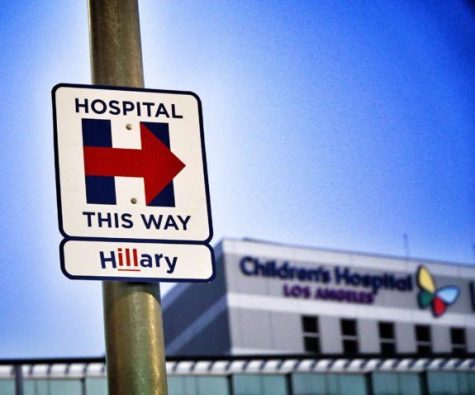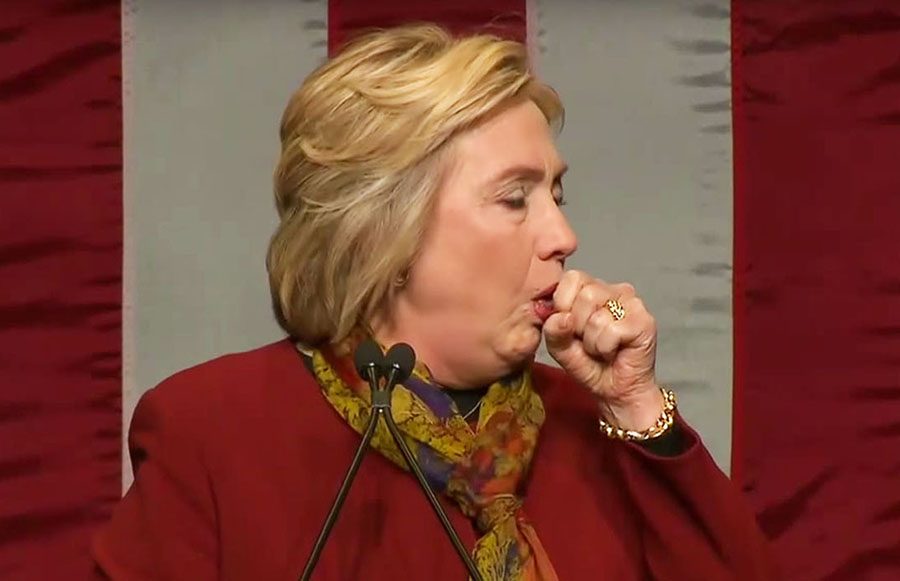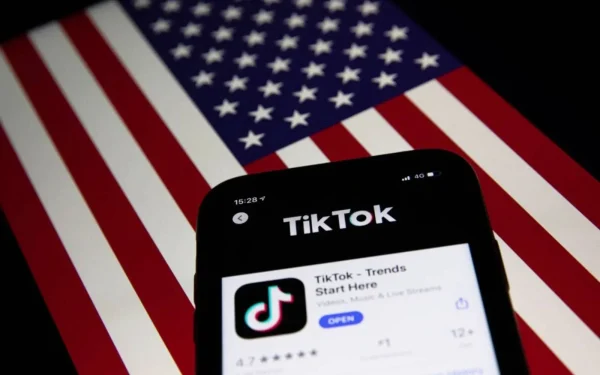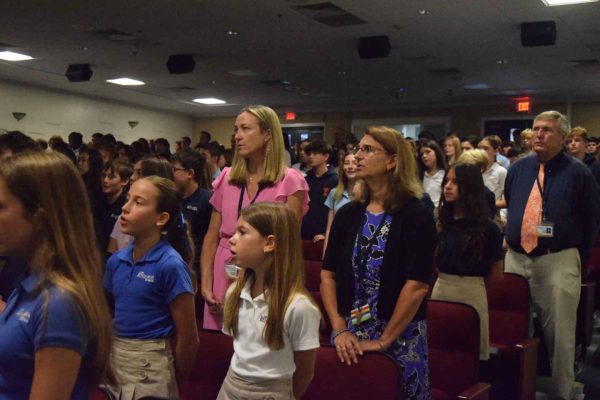Putting the “ill” in Hillary
The Neersyde looks objectively at the concerns surrounding the health of presidential candidate Hillary Clinton.
Photo courtesy of www.conservativeoutfitters.com.
Hillary Clinton’s coughs and general health have been debated on both sides of the aisle this year.
Isn’t it horrible when you have a big test and are sick that day? You get out of bed feeling woozy and have a cough. Scared and worried, you aimlessly think about what would happen if you missed the test. You tough it out and attend school but get sent home by the nurse after taking the test. After recovering from your illness, you return to campus, going to teachers, rushing to catch up, and worried that you will fall behind. The only thing that could be worse? Being sick while running in the presidential election that is coming up in a little over two months. While kids are only catching up on math, science, and English homework, a presidential candidate who has to take sick days faces the possibility of losing serious ground in the race. Presidents and presidential candidates, as well as their running mates, need to stay healthy so they can run grueling campaigns and prepare for a four or eight-year term in the White House.
Former First Lady and former Secretary of State Hillary Clinton, the Democratic nominee for the president of the United States, fell ill during the 9/11 remembrance ceremony this past September. Cameras captured her starting to faint and her knees buckling as she boarded a van to leave the ceremony. She ended up leaving early because she was allegedly overheated. Clinton was helped into the van by her aides and hurried out of the area to recuperate at the downtown apartment of her daughter, Chelsea. Such a sight is troubling for a presidential nominee because the public may lose faith in her ability to lead the country if she is not fully healthy.
After the incident, Clinton went back to the hospital for a follow-up check up. Her doctor and her campaign revealed that two days before the 9/11 ceremony, she was diagnosed with pneumonia, put on antibiotics, and told to rest, but she did not. This is why she became dehydrated and weak. In this situation, Clinton probably should have taken a day or two off to get better as her doctor

Signs such as these, playing on Clinton’s campaign logo, popped up all over Los Angeles prior to her fundraising stop in Tinseltown at the end of August.
recommended. Though she recovered and is back on the campaign trail, Clinton has also been plagued by coughing spells which have drawn attention from supporters and opponents alike. While Democrats insist Clinton simply has seasonal allergies, Republicans argue her cough suggests a more serious health issue. As a result, both candidates were asked to release letters from their doctors which attest to their health.
Secretary Clinton’s letter was shortly released after the scare at the 9/11 memorial. This was her first medical statement since July 2015. It confirmed that she has seen her doctor regularly for blood tests, allergy flares, and new medication. The letter then went on to provide some of her evaluations and results, including an ear infection, a low grade fever, congestion, and fatigue. The fever eventually turned into pneumonia. However, Clinton was pronounced in good health to continue her run for the presidency.
Soon after Clinton’s health letter was sent out, Republican nominee Donald Trump had his doctor send out one of his own. It was presented and read briefly on The Dr. Oz Show, but soon the whole document was made public according to Maggie Haberman’s New York Times article “New Doctor’s Note Describes Donald Trump’s Health as Excellent.” Two weeks earlier, Trump released a much shorter note in which his doctor asserted that he was the healthiest candidate that could be elected for the job.
It may not be as big of a deal as being sick during a presidential election, but the students at The Benjamin School also must adhere to some policies and rules when it comes to getting sick. TBS employs a tracking system, via email, that tells the faculty if students are at the school clinic or have gone home from school because they are ill. In addition, onCampus, the new learning management software, allows faculty to see how many times a certain student has been absent or dismissed.
The Benjamin clinic advises that children should stay home if they have a fever, if they are experiencing flu-like symptoms, or if they are afflicted with a contagious disease such as chicken pox. Doing so ensures that the school population remains healthy and prevents other students from getting sick. Students should not stay home if it is a minor sickness because they will fall behind in class and will have to spend extra time to get caught up.
“When fall comes, we start to see a lot of kids since flu season starts around this time,” said Mrs. Karen Velinsky, the head nurse for the Lower/Middle School Campus. “Around this time [in the school year], we will start to [see] a lot of viruses [in kids], mostly upper respiratory. We usually see an average of five or six kids a day around this time of the year. We will usually tell if a kid has to go home by [his or her temperature],” she said.
But what is at stake when a student goes home sick? “If a student is absent because of an illness, this is not held against [him or her],” said Dean of Students Mr. Jeffrey Cavallo. “If a student has 10 absent days not related to sickness, they will not get credit for that quarter.” For teachers, though, getting sick seems much more of a burden. If a teacher is not in a class, that class has to have a substitute who may not have the expertise or familiarity with the material in order to teach the students. Students will then not learn the lesson, placing both them and the teacher behind.
However, TBS does have a system in place for teachers to take some of the stress out of getting sick. A TBS faculty member gets 10 sick days a year. Any of those days that go unused roll over to the next year. As a result, a teacher can accumulate up to 90 sick days total. In addition, if a teacher uses up all of his or her sick days, there is a system called Helping Hands where teachers can donate sick days to other teachers in need each year. According to Head of Middle School Mr. Charles Hagy, Helping Hands is the wonderful invention of our Human Resources Department headed up by Human Resources Director Mrs. Patti Maiselson.
Sick days are something that no student, teacher, or even presidential candidate wants to experience. However, it seems that the older you get, the higher the stakes. Add in the fact that both Clinton (who will be 69-years-old at the time of the election) and Trump (currently 70) would be one of the oldest presidents ever elected, and that, coupled with any health issues they may be facing, is enough to give any voter pause. Not only will the candidates be judged on their plans for curing the country’s ills, but also on their own personal ailments and infirmities.






Hudson Hale • Oct 13, 2016 at 12:49 pm
Hillary is a strong leader and a fighter!
Kathy Wood • Sep 29, 2016 at 5:18 pm
Very well written Sadie. But as your 68 year old grandmother, I take offense at being characterized as old and infirm LOL! Oh, and by the way #IMWITHHER. Love You❤️!